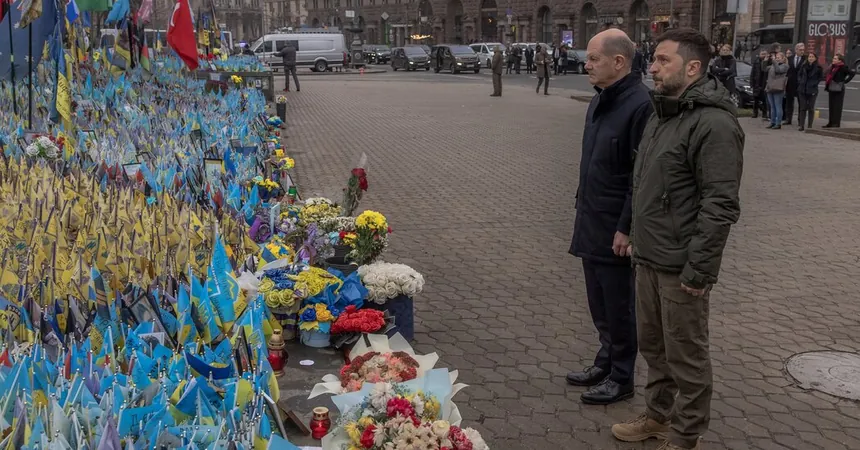
Germany Steps Up Military Support for Ukraine During Scholz's Surprise Visit - What It Means for the War!
2024-12-02
Author: Lok
Germany Steps Up Military Support for Ukraine
In a surprising turn of events, German Chancellor Olaf Scholz made his first visit to Ukraine in over two years on Monday, amid rising fears in Kyiv that Western military support might dwindle as calls for a negotiated settlement with Russia gain momentum.
The Context of Scholz's Visit
Scholz's trip comes on the heels of a controversial phone call he had with Russian President Vladimir Putin, sparking outrage among Ukrainian officials who view such outreach as a dangerous step towards legitimizing the Kremlin’s stance. President Volodymyr Zelensky vocally criticized the call, warning it could "open a Pandora's box" by encouraging other leaders to engage with Putin, thereby compromising Ukraine's position.
Military Aid Announcement
During his visit, Scholz aimed to ease tensions and reassure Ukraine of Germany's unwavering support. He announced a substantial military aid package worth $680 million, including essential air defense systems and armored vehicles, set to be delivered by the end of the year.
Reassuring Support
"We will not weaken our support for Ukraine," Scholz affirmed at a Kyiv press conference, bringing a sigh of relief to Ukrainian leadership who have voiced frustrations over delays in Western assistance.
Concerns Over U.S. Policy Changes
The context of this visit is critical, as Ukraine grows anxious over the potential impact of the incoming U.S. Trump administration, which could alter the landscape of financial and military aid. European leaders have been actively strategizing how to sustain Ukraine’s defense as Russian forces intensify their operations on the battlefield.
Germany's Commitment
Germany has emerged as a key player, having committed over $15 billion to Ukraine in military, financial, and humanitarian aid since the conflict erupted in 2022.
Political Dynamics in Germany
Scholz's visit also serves a dual purpose; it addresses domestic political pressure as early elections loom in Germany next February. The Chancellor has faced criticism from conservative opposition leader Friedrich Merz for perceived insufficient support to Kyiv, particularly regarding the refusal to send long-range missiles.
Balancing Act
Striking a delicate balance, Scholz’s approach aims to demonstrate Germany’s commitment to Ukraine while also adhering to his stance against escalating the conflict with powerful weaponry. He underscored the importance of maintaining dialogue with Putin, although Zelensky remains firm on the necessity of isolating the Russian president diplomatically.
Future Prospects for Peace Talks
Zelensky expressed optimism about the prospect of peace talks occurring next year, albeit contingent upon the future U.S. administration’s stance on Ukraine. He emphasized the need for Europe to enhance its support structures for Kyiv, articulating concerns that an abrupt shift in U.S. policy could compromise Ukraine's territorial integrity and security.
Speculations on U.S. Support
Despite anxieties surrounding Trump's campaign rhetoric promising to resolve the war swiftly, there is speculation that the ex-president may even bolster military support for Ukraine as a strategic leverage against Russia.
European Resolve
As the situation evolves, European leaders, including the newly appointed president of the European Council, António Costa, have reiterated their commitment to sustaining steadfast support for Ukraine.
Conclusion
As we watch these developments unfold, one question lingers: Can Germany and its European partners maintain the resolve to support Ukraine against the backdrop of shifting U.S. foreign policy? Stay tuned to find out how this critical geopolitical conflict plays out!




 Brasil (PT)
Brasil (PT)
 Canada (EN)
Canada (EN)
 Chile (ES)
Chile (ES)
 España (ES)
España (ES)
 France (FR)
France (FR)
 Hong Kong (EN)
Hong Kong (EN)
 Italia (IT)
Italia (IT)
 日本 (JA)
日本 (JA)
 Magyarország (HU)
Magyarország (HU)
 Norge (NO)
Norge (NO)
 Polska (PL)
Polska (PL)
 Schweiz (DE)
Schweiz (DE)
 Singapore (EN)
Singapore (EN)
 Sverige (SV)
Sverige (SV)
 Suomi (FI)
Suomi (FI)
 Türkiye (TR)
Türkiye (TR)